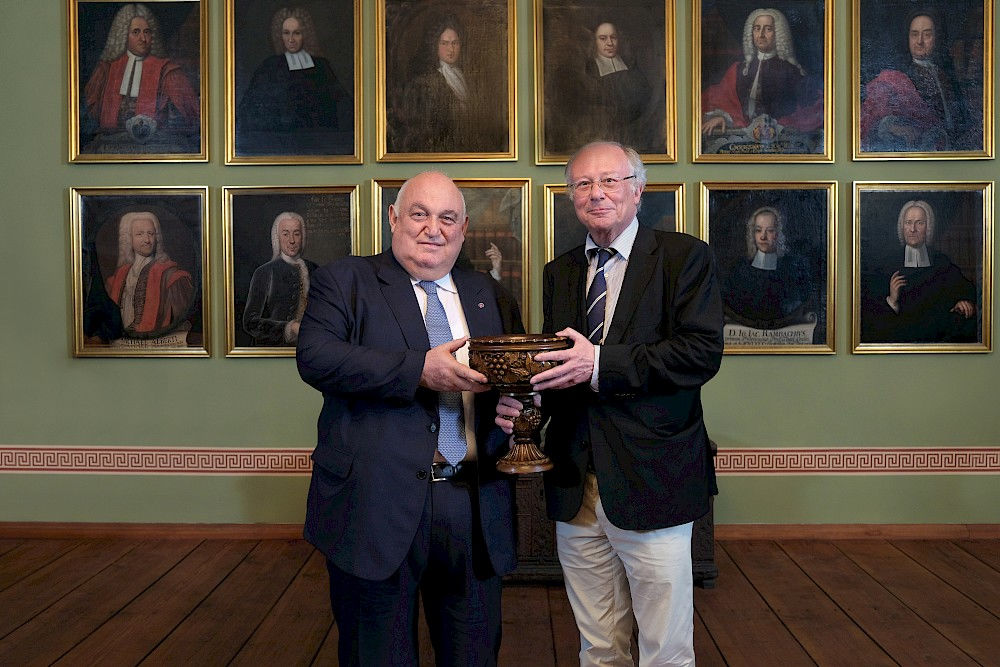A connection with history

All three travelled to Halle from the Caucuses to take part in a week of celebrations honouring the 200th anniversary of the merger of the universities of Halle and Wittenberg. Rector Aram Simonyan, his office manager, and the dean of the Faculty of Theology extended their congratulations in June along with other university partners from the USA, China and Russia. The Armenians’ luggage contained more than just the gift of a traditionally carved wooden vase. “We also brought with us more than 40 books for the MESROP Centre for Armenian Studies,” said Rector Simonyan after the official anniversary ceremony. “Many of our scholars have a very close and personal relationship with Martin Luther University because they used to study in Halle,” he explained. For example, one alumna of YSU has been teaching and conducting research for decades in Halle. Professor Armenuhi Drost-Abgarjan studied at YSU and came to the University of Halle in 1985 where she is now the head of the MESROP Centre. Here, scholars from both countries study the history and culture of Armenia.
Three million people live in Armenia, 20,000 of which study at YSU. “Our university is the oldest and largest in our small country,” explains Rector Simonyan. During the celebratory event, he and Rector Udo Sträter agreed to extend the intensive cooperation between their universities for a further ten years. Many researchers from Halle and Yerevan have been guests at the respective partner universities, attending conferences and undertaking research stays. A joint international summer school, a German-Armenian conference, and an academic hour of remembrance for the Armenian victims of genocide in the Ottoman Empire are some of the most formative events of the ten-year cooperation.
“In the future, we would specifically like to strengthen the exchange of PhD candidates and students,” Simonyan announced in Halle. The historian sees potential in several areas. “One example is in biology. We have young, highly-qualified scientists at YSU in the fields of genetics, microbiology and ecology.” Halle can profit more strongly from Yerevan in other areas as well. “We have excellent relationships and contacts to universities in our neighbouring countries, like Iran. This could also be of benefit to the Orientalists in Halle.”
A small country with a big tradition
Seventeen professors from three different faculties at the University of Halle have been involved in the partnership so far. It is being coordinated by professors Cornelia B. Horn, Alexander Markarov and Andreas Ranft. Halle’s theologians, German studies experts, archaeologists, art historians and Orientalists study the rich history and culture of this small country. For example, they have gone there to study prehistoric rock formations and gold finds, and have analysed the transition of the political system following the break-up of the Soviet Union.
One current cooperation project is the creation of a joint German-Armenian theology handbook. It contains a brief description of each of the different theological disciplines written by representatives from each discipline. What initially sounds unspectacular is indispensable for the exchange, explains Halle’s expert on the Eastern Church, Dr Martin Illert. “This self-description is a first step in a dialogue, before you can approach your partner with your own interpretation.”
The country in the Caucasus is particularly important to theologians. Armenia is the oldest Christian nation in the world. Armenia’s King Trdat III declared Christianity to be the state religion as early as the 4th century. Shortly thereafter – at the start of the 5th century – the monk Mesrop Maschtoz developed Armenia’s written language. “Language has always been very important in preserving the identity and culture of Armenia and the Church was the place where this tradition was cultivated. This is why theology still plays an important role in Armenian culture today,” explains Illert, who visited the Faculty of Theology at YSU in April.
Intercultural crash course in theology
One result of his visit is a new scholarship programme that should allow theology students from Yerevan to study in Halle starting in 2018. One of the theologian’s long-term goals is to offer students from Halle the opportunity to participate in excursions or block seminars in the 2,800 kilometre-distant country. “Armenia is an important bridge because it connects us to regions that are otherwise very far away from us. Theology needs this type of encounter,” he says. “The exchange is also an intercultural crash course, since coping with differences requires intercultural skills.”
The differences between the two faculties are substantial. The Faculty of Theology in Yerevan is subordinate to the Armenian Apostolic Church and nearly all students are orthodox Christians. “In our partner faculty there is a much stronger degree of awareness of being part of the Church. For them, theology cannot be separated from the ecclesiastical and, particularly, from the liturgical,” explains Illert. This is why the exchange is so enriching for both parties. “When they are here with us, the Armenian theologians are unfettered from this liturgical and ecclesiastical context and therefore can distance themselves somewhat from this. At the same time, we are able to comprehend how liturgically influenced piety impacts the direct theological debate.”
It is for this reason that nuances are important for the exchange. “We can hold a presentation on the 4th-century Church and, using this example, also discuss the different ideas and methods that collide,” explains the instructor. It’s not about just simply imparting your own standards on your partner, it’s about holding an interdenominational discourse. Illert is convinced that “such a discourse can impact and change both faculties.”
